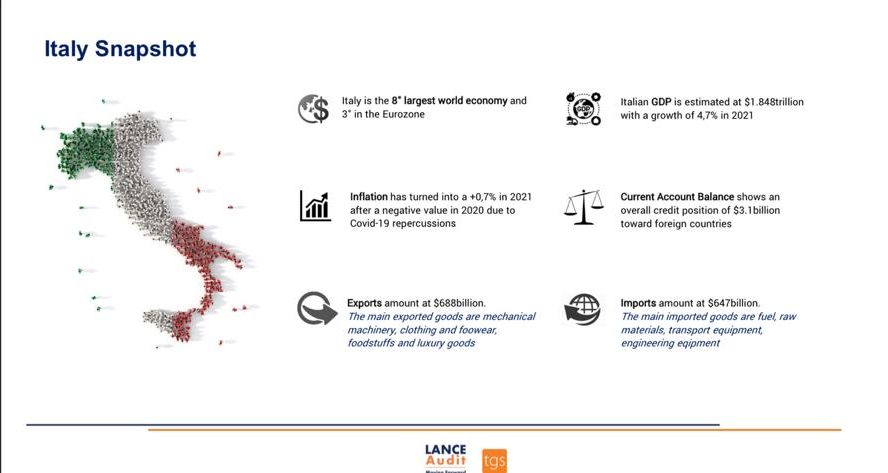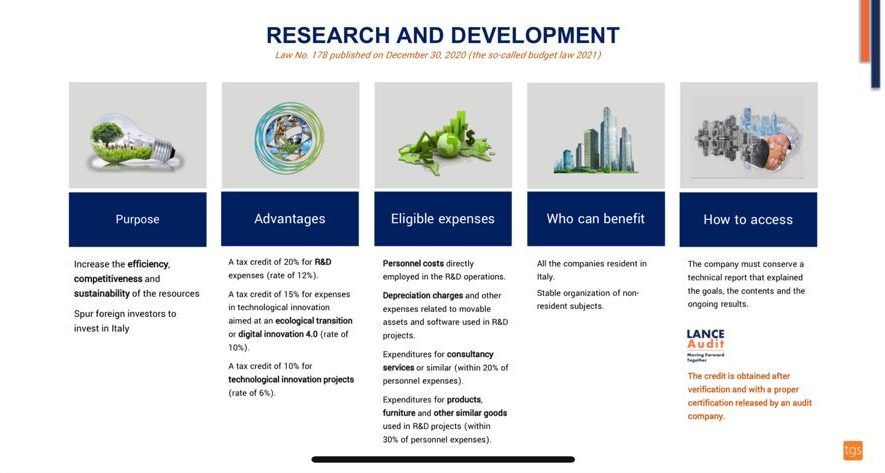13/07/2021
Doing Business in Italy
Business advisory Doing business Events
Italy, the world’s eighth-largest economy, is a democratic republic recognized by UNESCO World Heritage as a global leader in culture and the Arts, history and science. The country is known for its excellence in fields such as design, food products, logistics, chemicals and car manufacturing.
Despite the economic downturn due to Covid-19, Italy’s financial situation has recently recovered strongly. Inflation has inched into positive territory, year-on-year GDP growth is highlights at 5%, and Italy recently reported a €3.1 billion current account surplus.
It should also be noted that Italy is heavily committed to the New Silk Road Initiative launched in September 2013 by the Chinese authorities, with the aim of better connecting Asia and Europe. This project also includes numerous upgrades to rail and other infrastructures.
Should businesses invest in Italy in 2021?
The short answer is YES. Here are some good reasons to invest in Italy:
- Italy is one of the world’s largest markets: Italy is the third largest economy in the Eurozone and the eighth biggest globally, benefitting from a central location that is a gateway to the European market and its 500 million consumers. Italy is also a strategic logistics hub, as the country’s proximity to North Africa and the Middle East makes it an ideal bridge between southern Europe and the other EU countries.
- Italy is a key global player in manufacturing and exports: To invest in Italy is to gain access to the country’s unique expertise in fashion, design, food, engineering, and automation exports. Companies investing in Italy know they can rely on an extensive network of SMEs and industrial clusters able to supply high-quality intermediate products to global value chains. In addition, Italy is a resourceful country with a strong fit between what it needs and what it provides, resulting in more international collaborative efforts, opportunities and benefits.
- Italy has a skilled and competitive workforce: The Italian education system is excellent: more than 20 different universities rank among the world’s top 500 academic institutions, reflecting the superior quality of education provided by universities, primary schools, private institutions, etc. Moreover, labour costs are below the Eurozone average across all industries (18% lower than France and 10% lower than Germany).
- Italy has an incomparable cultural offer and ‘nation brand’: The country is ranked number 1 on the UNESCO World Heritage list, and is one of the world’s favourite tourist destinations, welcoming over 60 million visitors annually. Combined with its world-renowned arts, music and food culture, Italy offers great quality of life to all who live there.

2021 Budget Law
The 2021 Budget Law adopted by the Italian government on December 30, 2020 has four strategic priorities:
- Boost the national economic recovery, especially in light of the COVID-19 pandemic.
- Reduce economic inequality across the population.
- Increase the country’s sustainability.
- Strengthen healthcare and medical institutions (the set of hospitals, clinics, private medical institutions, laboratories …)
A range of tax credits and incentives have been introduced to improve Italy’s competitiveness. This support is primarily focussed on sustainable investment, R&D, technological innovation 4.0, new capital assets, and improving the energy efficiency of buildings.
The next section of this article describes some of the benefits available to foreign companies under the 2021 Budget Law.
Excellence in research, development and innovation
Research and innovation are widely integrated into industrial processes, with recognized excellence in sciences, physics and engineering, social sciences, and humanities. Read on for a summary of initiatives by the Ministry of Economy and Finance to promote ecology and digitalization.
The 2021 Budget Act has re-structured the incentive system:
- A tax credit of 20% for R&D expenses (at a rate of 12% of the eligible expenses* up to a limit of EUR 3 million)
- A tax credit of 15% for spending on technological innovation relating to the ecological transition or digital innovation 4.0 (10% of the eligible expenses). Eligible investments may include products, training, advanced manufacturing solutions, IT systems to interconnect business units, cybersecurity, etc.
- A tax credit of 10% for technological innovation projects (6% of eligible expenses): this measure concerns ‘applied research’, which seeks to acquire new knowledge for a specific practical purpose or objective, as well as the subsequent implementation and improvements where applicable. If you can prove on paper that your project and process are viable, you can deduct 6% of the eligible expenses (subject to a limit of EUR 500,000).
*Eligible expenses covers everything that is part of the initiative.
Eligible population
Any company domiciled in Italy can benefit from these tax credits, but the company must produce and retain a technical report describing the goals, content and ongoing results (including support costs, numbers sustained, etc.).
Note: Tax credits are granted only after verification and with proper certification issued by an audit company!

Italian Sustainable Development
The 2021 Budget Law also concerns sustainable development. Here are three incentives available to foreign investors planning to grow a sustainable business in Italy:
- 110% Superbonus: This measure is an incentive to make homes and other buildings more efficient. It allows up to 100% of expenses for energy-efficiency or anti-seismic improvements to be deducted. The incentive can also be provided via a discount on the invoice (up to 100% of the cost) or through a tax credit.
- Ecobonus: This incentive scheme can result in a deduction of 50-65%, depending on your project. For example, you might receive a 65% deduction for work to improve the energy efficiency of buildings, or a 50% deduction for a building stock renovation and recovery project (to improve the overall eco-efficiency of houses in the real estate sector).
- Green New Deal: The European Commission-sponsored Green New Deal project aims to encourage energy-saving, raise awareness of environmental sustainability issues and cut carbon emissions as a means of limiting climate change risks by 2023. As a signatory to this deal, Italy welcomes investors in companies working to build a greener world.
Visas for foreign workers
This article only addresses visas for foreigners intending to work in Italy.
The visa procedure is slightly different to that of other European countries, due to a specificity of Italian law: the Flow Decree.
About the ‘Flow Decree’
Every year, the Italian government sets a quota limiting the number of workers allowed to enter Italy. It can also decide which nationalities are allowed to come to Italy. Visitors should therefore be aware that the conditions for obtaining a visa can be more restrictive in Italy.
Who needs a visa?
- All company directors intending to physically visit Italy will need a visa. However, partners, shareholders and directors who remain in their own country do not require one.
- In the case of foreign companies with highly qualified employees (that have branches in Italy), a special visa is required, but is not subject to the Flow Decree.
- For a foreign company with only a representative office in Italy (i.e. smaller than a branch, acting only to represent the firm): the firm that sends you must be based in a State that is a member of the World Trade Organization (WTO).
- Managers at organizations headquartered in Italy or another EU country.
‘IMPATRIATI’ TAX RELIEF SCHEME
Workers who make Italy their country of residence may be eligible for tax relief in Italy, subject to fulfilling the following conditions:
- Must not have been resident in Italy for tax purposes during the two tax years preceding the relocation.
- Must remain tax-resident in Italy for a minimum of two years;
- Must work primarily on Italian soil.
Tax advantages
When your visa is rubber-stamped, you become resident in Italy for tax purposes. How much tax relief can you claim?
Top tax rate in Italy: 43%
- Taxes are paid only on 30% of income for the year during which tax residence is moved, and also for the following 4 years (valid for 5 years), resulting in an overall deduction of 70% in your income, reducing the tax rate to less than 13% even for the maximum tax bracket.
- Subsidized income includes subordinate, autonomous, and business
Note: Business income derived from a participating interest in a company is not eligible for the subsidy.
‘Impatriate’ additional benefit
Taxes are payable on only 10% of income if you move to a Southern region of Italy (such as Abruzzo, Molise, Campania or Sicilia).
Benefits may be renewed for a further five tax period to:
- Workers with one or more minor or dependent children,
- Workers who become owners of at one or more dwellings in Italy, either after the transfer or during the preceding 12 months.
For the extended period, tax is paid on 50% of income, or 10% in the case of workers with three or more minor or dependent children.
Download “Doing Business in Italy” guide on Lance Audit website
Does your firm need advice to work in Italy?




